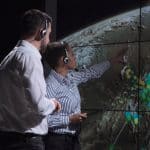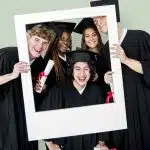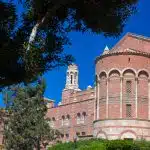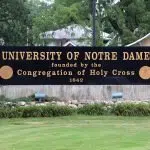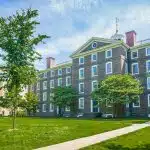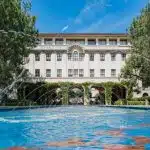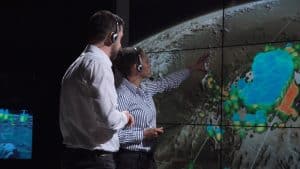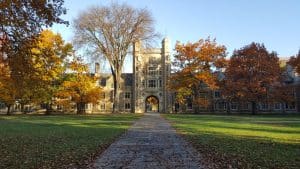Harvard University is known for its world-class academics and faculty. They have a core curriculum that everyone should take, together with electives and concentrations according to your program. Fortunately, there are hundreds of unique courses at Harvard you can choose from to fulfill those requirements. We’ll list 15 of those classes you can consider taking.
- Unique Arts and Humanities Courses at Harvard
- Unique Science and Technology Courses at Harvard
- Unique Social Sciences Courses at Harvard
- Frequently Asked Questions
- Takeaways
Unique Arts and Humanities Courses at Harvard
Humanities explore what it means to be human by analyzing human experiences, values, and expressions across time through literature, arts, and culture. It helps us gain a deeper understanding of ourselves and the world around us.
1. GenEd 1001: Stories from the End of the World
This course by the Committee on the Study of Religion will focus on how and why humans feel the need to imagine the end of the world order. You’ll be looking at the history of the idea of the “end of the world as we know it” and analyze contemporary cultural products that fit the apocalyptic theme—such as movies, short stories, songs, art, and video games.
You will also be asked to connect how imagining an apocalyptic future actually also lets you reflect on the present, such as thinking about what humans are doing wrong.
At the end of the class, you’ll also reflect on how you imagine the end of the world to be and present it through writing, photography, song, or other means you want.
2. English 148. Modern Monsters in Literature and Film
In this class from the Department of English, you’ll be looking into humanity’s fascination with monsters. Starting with Mary Shelley’s Frankenstein in 1818, you’ll branch out to other fiction stories, such as those by Sheridan Le Fanu, Bram Stoker, and Mary Elizabeth Braddon. You’ll also watch related horror films.
You’ll look at how monster stories reflect society’s systems of categorization and ideas of normality. You’ll also see humanity’s potential for violence in the name of protecting identity and community.
3. FYSEMR 63T: What is Avant-Garde?
This course by the Department of Slavic Languages & Literatures will look at avant-garde art as a possible playful interplay between invention and convention rather than a violent break from the art that precedes it. You’ll also look at the afterlife of the avant-garde and how its legacy shapes aesthetic innovation in a later period.
You’ll compare historical examples (like the conceptual experiments of the Dada and Suprematist groups) with later work (such as those by Andy Warhol and the cinematic experiments of Jean-Luc Godard).
By analyzing examples from different time periods, you’ll be able to better see the range of artistic, social, and political mobilizations of the term “avant-garde.”
4. COMPLIT 239: Multilingualism as Critique
Offered by the Department of Comparative Literature, this class studies the theoretical and practical implications of multilingualism. The idea is that the existence and use of multiple languages within texts and societies offer different points for analysis.
You’ll understand how multilingual texts and practices affect our conceptualizations of individual identity and collective belonging. After all, if you can navigate multiple languages, you can also create new ways of understanding the writer and their communities.
In this class, you’ll try to develop what a “multilingual critical theory” might look like. This involves studying how insights gained from analyzing multilingualism can contribute to and possibly reshape existing theoretical frameworks across disciplines.
5. FOLKMYTH 100: Introduction to Folklore & Mythology
This course by The Committee on Degrees in Folklore & Mythology gives you a comprehensive foundation on the world of folklore and mythology. You’ll be introduced to a wide range of folklore and mythological traditions from different cultures around the world to identify common themes, structural patterns, and cultural variations in human storytelling and belief systems.
You’ll also look at the various roles that folklore and mythology have played in human societies, such as:
- Explaining the world and natural phenomena
- Passing down cultural values and beliefs
- Providing social cohesion and reinforcing group identity
- Offering entertainment and imaginative expression
- Dealing with existential questions and anxieties
Unique Science and Technology Courses at Harvard
Science and technology courses are designed to develop your understanding of the natural and designed world and hone your innovation skills. You’ll explore scientific concepts, technological tools, and their societal impacts, preparing you for a technologically advanced world.
6. Astronomy 2: Celestial Navigation
Have you always thought about how cool it was that our ancestors explored the world using the sky to guide them? In this course by the Department of Astronomy, you can learn to do that too!
Astronomy 2 will teach you to use navigators’ tools like the sextant, compass, and charts so you never get lost on sea, land, or air. You’ll hone different practical skills and collaborative problem-solving. You’ll also use historical artifacts like instruments, maps, captains’ logs, and even student-built devices.
At the end of the course, you’ll go on a day-long cruise to practice your navigation skills.
7. ESE 133: Atmospheric Chemistry
This class from the Department of Environmental Science and Engineering will show you how the chemical and physical processes undergone by different components of the atmosphere can affect air pollution, climate, and life on Earth. This includes:
- Nitrogen, oxygen, and carbon cycles
- How acid rain, nitrogen, and mercury are deposited into ecosystems
- The oxidizing power of the atmosphere
As an engineering course, you’ll learn how you can construct engineering models and apply chemical principles to help you understand and solve pressing environmental problems.
8. ENG-SCI 24: Flavor Molecules of Food Fermentation: Exploration and Inquiry
In this course from the School of Engineering and Applied Sciences (SEAS), you’ll look into the production, properties, and characterization of certain specialized molecules through food fermentation. These molecules are made by microorganisms as a normal part of their metabolic processes.
You’ll particularly be looking at the small molecules that contribute to the taste and smell of fermented foods. Your output for this class will be designing and implementing your own research project based on any fermented food you want. If you take this course in the Spring term, you’re welcome to continue your research project through the summer.
9. Neuro 57: Animal Behavior
Are you a fur parent or just an animal lover in general? This course by the Department of Molecular and Cellular Biology is for you!
This class will give you an overview of the diverse behaviors of animals in their natural environments. You’ll examine the neural, hormonal, and genetic causes of behavior and understand the adaptive significance of behaviors and how they have evolved over time.
Understanding the evolutionary roots of behavior can also give you deep insights into the pressures that have shaped the animal kingdom.
The course is highly interdisciplinary, drawing on principles from neuroscience, biology, evolution, ecology, genetics, and psychology.
10. ENG-SCI 26: Humanity and its Futures: AI and Human Cognition
This course from SEAS is a timely and relevant class where you’ll study the relationship between AI and human cognition. You’ll explore the capabilities and limitations of AI and its potential impact on the future of humanity. After all, AI is rapidly advancing, especially in areas like healthcare, education, transportation, and the arts.
The class integrates computer science, statistics, big data, cognitive science, psychology, and philosophy. You’ll be faced with questions about the nature of intelligence, consciousness, and the future of humanity and human cognition in the face of technological change.
Unique Social Sciences Courses at Harvard
Social sciences are the systematic study of human society and social relationships, helping you understand social structures, behaviors, and interactions. You’ll be able to develop critical thinking about societal issues, promote civic engagement, and appreciate diverse cultures and perspectives.
11. GenEd 1178 – Mexico’s Culinary Roots: 10,000 Years of Food History
In this class from the Department of Anthropology, you’ll study how and why Mexico’s culture and cuisine have changed in 10,000 years through the lens of different disciplines, including:
- Archaeology
- Anthropology
- Climatology
- Botany
- Genetics
- History
You’ll also look at how the country’s famous menu items (like tacos, guacamole, and margaritas) helped shape the world.
On a larger scale, you can reflect on how ancient food culture has affected how we eat today and what we can learn from the past to help us solve any problems regarding the future of food.
12. AFRAMER 143Y: African Landscape Architecture: Alternative Futures for the Field
This course by the Department of African and African American Studies will try to answer three questions:
- What is the state of landscape architecture in African countries?
- What can we learn from landscape practices in African societies that can help lighten the impacts of climate change and social inequities?
- How can Africa continue to use landscape architecture to assert its agency in fighting against changing climates and social inequity, creating a space for itself in shaping African cities?
Every week, you’ll focus on different countries to explore how landscape architecture is taught and practiced in places where the profession is rare or non-existent.
13. ANTHRO 1603 – Law and Its Limits
This course is also by the Department of Anthropology, where you’ll look at the law through the lens of anthropology instead of from a legal or political science perspective. To do this, you’ll:
- Do close readings of ethnographic accounts of judicial processes and legal practices in various cultural contexts
- Understand how law is embedded within specific social and cultural frameworks, and how these contexts shape its interpretation and impact
- Exploring how different groups within a society experience and interact with the legal system
You’ll witness the inherent tension between the perceived power of law to shape societies while also being frequently powerless in the face of certain social, political, and environmental problems. You’ll be encouraged to question assumptions about the law’s neutrality, universality, and effectiveness.
14. Government 1433: Tech Science: From Democracy to Technocracy and Back
In this class by the Department of Government, you’ll study the political implications of technology and how technology is shaping and being shaped by democratic and potentially technocratic forces.
Some questions this course will allow you to reflect on are:
- How do technological advancements (like AI, big data, and social media) affect democratic processes, governance, and individual rights?
- How can democratic values and institutions adapt to and regulate rapidly evolving technologies?
- What are the ethical considerations and societal consequences of these technological shifts in the political sphere?
15. History 1600: American Capitalism
This course by the Department of History will show you that American capitalism isn’t just an economic system. Instead, it’s also deeply connected with the country’s social, political, and cultural development. You’ll look into the historical roots and transformations of capitalism to get context for understanding contemporary America.
Though this is a history class, it’s also highly interdisciplinary where you’ll draw upon insights from economics, sociology, political science, and even cultural studies for a more well-rounded study of American capitalism.
This class also gives you a historical lens through which you can understand ongoing discussions such as:
- Inequality
- Labor relations
- Role of government
- Impact of technological change
- Ethical implications of wealth creation
Frequently Asked Questions
1. What is the best course at Harvard?
There’s no objectively best course at Harvard since the best classes for you depend on your individual interests, academic goals, and learning styles. If you’re a foodie, food-related classes like GenEd 1178 might interest you. On the other hand, if you’re curious about how the law operates in other parts of the world or in another time period, then you might consider Anthro 1603. add
2. What are the easiest classes at Harvard?
It’s hard to identify the “easiest” classes at Harvard since it depends on your strengths and prior knowledge of a certain subject. If you have some background in studying the Italian language, for example, then you might more easily grasp new lessons compared to those who have no foundation yet.
3. Are there free courses at Harvard?
Yes, Harvard University offers a significant number of free courses through various online platforms, most notably through the Professional and Lifelong Learning Platform.
Takeaways
- Harvard College has hundreds of unique and interesting courses that allow you to fulfill your required units.
- There’s no objectively “easiest” or “best” course at Harvard since those depend on factors like your interests, strengths, academic and professional goals, and background of the subject matter.
- Did you find a unique Harvard course you’re interested in? A private consultant can guide you in the high school academics and extracurriculars you can take to improve your college application.







